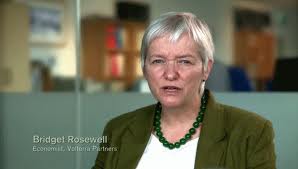21st Century Policy Development
By Bridget Rosewell
I spoke last week at a fascinating day on how policy development needs to be rethought, organised by Synthesis of which I am an Associate. The day made clear that both the techniques now available to us (computer modelling, simulation techniques) and our understanding of the elements of our problems (dynamics, feedbacks, behaviours, networks) suggest that we are making as big a policy shift as when big government first became fashionable in the twentieth century.
Then people believed, from the Webbs to Gordon Brown, that government could solve all our problems and make us be happy. Now we are more sceptical of these claims, even though we are starting to measure happiness, and of our government’s ability to devise and execute appropriate policies. Hats off to Matt Hancock and Jesse Norman, MPs who supported last week’s conference and opened and closed it with their own perspectives.
My own contribution to the debate was from my engagement over the couple of decades with infrastructure projects. I found it hard to stop grinning when the Chancellor, in his Autumn Statement, stated that infrastructure supports economic growth, since this is a case I have been making for more than a little while. However, the analytical underpinnings of this argument and how it relates to both the financing and the funding of projects is still not well articulated or understood and I talked about some of these issues in relation to investments that I have been involved in, such as Crossrail, High Speed rail, Thames Gateway Bridge (and more).
Successful policy development requires several different perspectives and this was illustrated in the context of security policy as well as infrastructure. Generating the right analysis is one essential element, but asking the right question is an important starting point, and getting support across the spectrum for a new approach is also key. The right analysis has to address the right question. ‘Is this railway worth paying for?’ is a good question and leads to asking who will pay for it and why. Is it passengers? Or property developers? Or does the taxpayer have to cough up for something unspecified, such as a welfare benefit?
Clear questions also require clearly articulated answers and the challenge to analysts and modellers is to provide models that policy makers can understand and challenge. Models cannot capture everything – by definition they are simplifications. Are the simplifications the right ones? Outcomes are inherently uncertain. Can the model show the likely range of outcomes with any degree of robustness? Our policy makers need to ask these questions of analysts rather than rely on a black box and their academics and civil servants.
There is a risk that one set of black boxes will be replaced by another set – cleverer ones no doubt. I hope not. I myself try to present arguments that have a common sense element but can be backed up by data and models. I need policy makers and politicians to challenge me and everyone else to make sure I succeed in creating these so that we can have a healthy policy debate rather than a technocratic one.


Bridget
I find it interesting to learn that policy makers at the government level might be adopting simulation methods. Having just received this afternoon a questionnaire from my local parish council seeking views on neighbourhood development, I am motivated to ask if you are aware of software that could allow simulation to be done at the small town/village level which could allow reasonably realistic testing of outcomes of different policies or actions.
Peter